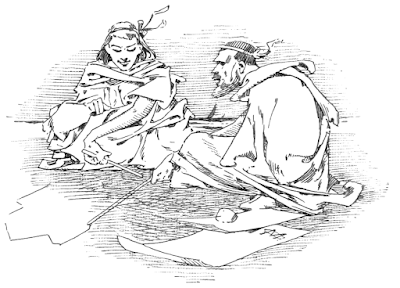Low Magic Rules for 5th Edition Dungeons & Dragons
The following are a set of rules (limitations mostly) I came up with which would allow 5th Edition D&D to be used for lower magic settings and types of games. Maybe something closer to historic-fantasy, though this might work for other kinds of settings as well.
Note that each of the elements below is essentially a separate toggle, you can use some and not others, as the setting dictates.
Races
Players are generally only allowed to play human characters. However, DMs might allow one of the following options:
- Option 1: Quirky Humans - Certain other races may be allowed, but are reskinned to simply represent slightly unusual humans.
- Option 2: Shunned - Certain other races are allowed, but represent weird beings from outside human civilization, shunned by most decent folk. Some individuals and organizations may view them with sympathy, but there’s every chance of a mob rising up against them.
- Option 3: Dying Race - Alternately, other races may not be always outcast, but members of ancient peoples whose time in this world is drawing to an end. They are viewed more with an air of pity or inspire thoughts about the vastness of history and impermanence of all things.
Classes
Only the following classes are allowed:
- Barbarians - If they fit the setting, they are generally allowed. If you aren't doing away with the supernatural entirely, then any type of Barbarian is available. However, if you are limiting magic even more, then Barbarians able to commune with nature spirits may be excluded.
- Fighters - Any kind of Fighter is allowed, so long as they do not cast spells.
- Monks - Martial artist Monks may not fit as well in every setting. But even in settings where they are possible, those with the ability to cast spells should be excluded.
- Rangers - Rangers fit fairly well except for their spellcasting abilities. A few options for DMs who want to include them:
- Option 1: Spirit Seeker & Spirit Walker - Grant them the Barbarian Features of these names at appropriate levels.
- Option 2: Wild Shape - Grants them the Druidic feature of this name.
- Option 3: Ritual Spells - If you want them to use ranger spells, treat them as having the Ritual Caster and Magic Initiate feats with regard to Ranger spells only.
- Rogues - Any kind of Rogue is allowed which does not cast spells.
Feats
The only magic-related Feats allowed are:
- Ritual Caster - A character with the appropriate class listing of Ritual Caster can cast normal ritual spells as per the usual rules. But additionally, they can cast any other spell on the class list they have access to (e.g. via spellbook) after a Long Rest and 8 hour ritual.
- Magic Initiate - All harm-causing cantrips are treated as 1st-level spells, but otherwise this feat works normally.
Magic Items
Spell books (or holy texts) still exist and may contain spells from any class list. Characters can not prepare spells to use on the fly (like a Wizard).
However, a character with the Ritual Caster or Magic Initiate feats, who also has the Arcana skill may use spellbooks (or the Religion skill for holy texts, or the Nature skill for druidic texts) to create and use magic items of the appropriate class type, as if they were a caster of equal level.
In addition there may also be documents containing plans, schematics, or rituals needed to produce specific magical objects. These may still require the appropriate skills, but do not require knowledge of specific spells as prerequisites.
Assume that every 8 hours of work produces 25gp worth of materials. This does not mean that a person's wage daily wage is worth anything like 25gp for most activities. It merely means that it takes a lot of extra money to circumvent the sheer number of hours spent crafting magical items.
| Rarity | Cost to Produce |
| Scrolls | Cost to Produce |
| Common* | 50 gp |
| Uncommon* | 500 gp |
| Rare* | 5,000 gp |
| Very Rare | 50,000 gp |
| Legendary | 500,000 gp |
* - For Common, Uncommon, and Rare items, also add the cost of a regular item to the total value (like Uncommon Mariner's Plate armor would be 500 gp for the enchantments +1500 gp for the plate armor).
Scrolls, or equivalent single-use items, only usable by those with a specific skill set, have slightly different costs:
| Scroll Level | Cost to Produce |
| Cantrip ** | 10 gp |
| 1 | 25 gp |
| 2 | 50 gp |
| 3 | 100 gp |
| 4 | 200 gp |
| 5 | 400 gp |
| 6 | 800 gp |
| 7 | 1600 gp |
| 8 | 3200 gp |
| 9 | 6400 gp |
** - Cantrips only take one hour to create a scroll for.
Some rarer materials may allow an item creator to circumvent these costs.
NPC Magicians
More powerful magicians may exist. Possibly some using the standard D&D rules. But these operate only as NPCs. For one reason or another they don't tend to get along well with most of humanity. As a result more powerful magic items and artifacts may be possible to more easily obtain by working through these folks.
Money
Most goods and services still have the same value, but excessively large treasures are rarer. In most adventures, any copper or silver coins listed in an adventure should still be used. However, the number of gold coins (and the value of any gems) should be scaled down to 1/10 or 1/100 of their normal amount.

Comments
Post a Comment
Due to continuing spam, there's now a delay for moderation.
Sorry. ¯\_(ツ)_/¯